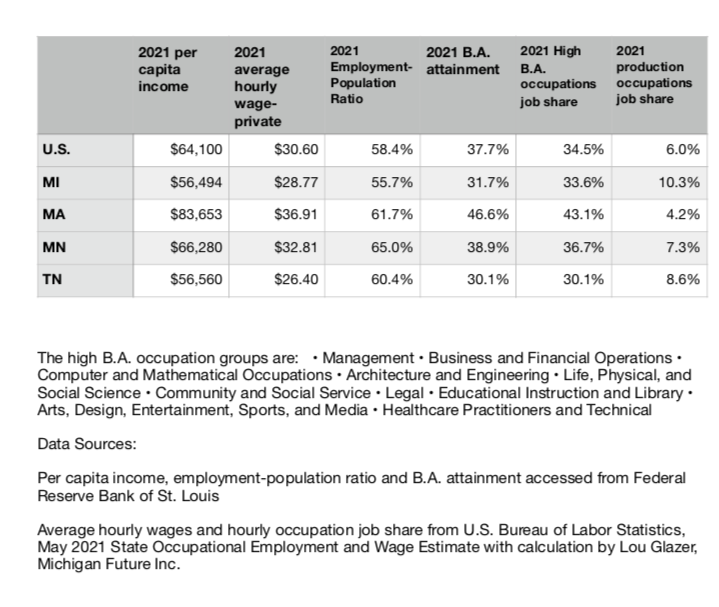
In our last post we detailed that states with employment most concentrated in production––front-line factory––jobs are all structurally low-prosperity states, with per capita income substantially below the nation’s. Those states include Michigan and Tennessee, both with per capita income twelve percent below the nation’s
Tennessee matters particularly because when it was chosen by Ford for its Blue Oval City electric vehicle automotive manufacturing ecosystem, it became the state that many Michigan political and business leaders put forward as the state Michigan should want to be like economically.
Which raises the question what state economy should Michigan want to be like? Is Tennessee the correct answer to that question?
In the table below we look at economic outcomes for the nation, Michigan, Massachusetts, Minnesota and Tennessee. The first three columns are the economic outcomes we all should want for Michigan: high per capita income, high average hourly wages for private sector employees and a high proportion of adults who are working (employment-population ratio).
If those are the outcomes we want for Michigan, it is clear that Tennessee is the wrong choice as a model for Michigan. Minnesota (chosen by us as a model because it is a non-coastal, cold-weather state) and, even more so, Massachusetts have far better economic well being outcomes. Both are far better choices for the state economy Michigan should want to be like.
As we explored in our last post it was clear to us in 2004 that “knowledge-based industries and young
knowledge workers will be the most important driver of future economic growth. Communities with high concentrations of both will become more prosperous, and communities with low concentrations will become poorer compared with their neighbors.”
You can see how that has played out in the B.A. attainment and high B.A. occupation job share columns in the table below. Unlike Tennessee, Minnesota and, far more so, Massachusetts have excelled at concentrating knowledge-based industries and young knowledge workers. The fact that they are less concentrated in factory jobs has not prevented them from structurally being high-prosperity states.

The reason why Minnesota and, far more so, Massachusetts are high-prosperity states and Michigan and Tennessee are not is that their economies are over concentrated in knowledge-based enterprises and adults with a B.A. or more. The two are inextricably linked. Because the asset that matters most to high-wage, high-growth. knowledge-based enterprises is talent. For Michigan to have the economic well being outcomes of Minnesota and Massachusetts we must make preparing, retaining and attracting talent economic development priority one.







